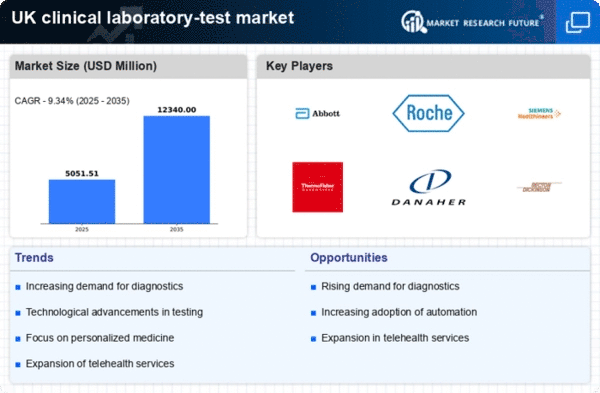Government Initiatives and Funding
Government initiatives aimed at improving healthcare infrastructure and funding for diagnostic services are significantly impacting the clinical laboratory-test market. The UK government has allocated substantial resources to enhance laboratory capabilities, which includes investments in advanced testing technologies and facilities. For instance, the NHS Long Term Plan emphasizes the importance of diagnostics in improving patient outcomes, which could lead to an increase in laboratory testing services. This financial support not only boosts the clinical laboratory-test market but also encourages innovation and the adoption of new testing methodologies. As a result, the market is poised for growth, driven by enhanced accessibility and improved testing options for patients.
Shift Towards Home Testing Solutions
The clinical laboratory-test market is witnessing a shift towards home testing solutions, driven by consumer demand for convenience and accessibility. With advancements in technology, patients can now perform various tests at home, such as blood glucose monitoring and cholesterol testing, without the need for a clinical visit. This trend is particularly appealing to those with chronic conditions who require regular monitoring. The convenience of home testing is likely to increase patient engagement and adherence to testing schedules, ultimately benefiting the clinical laboratory-test market. As more companies develop reliable and user-friendly home testing kits, the market is expected to grow, reflecting changing consumer preferences in healthcare.
Rising Prevalence of Chronic Diseases
The clinical laboratory-test market is experiencing growth due to the increasing prevalence of chronic diseases in the UK. Conditions such as diabetes, cardiovascular diseases, and cancer are on the rise, necessitating regular testing and monitoring. According to recent data, chronic diseases account for approximately 70% of all deaths in the UK, highlighting the urgent need for effective diagnostic tools. This trend drives demand for laboratory tests that can provide timely and accurate results, enabling healthcare providers to make informed decisions. As the population ages and lifestyle-related health issues become more common, the clinical laboratory-test market is likely to expand further, with an emphasis on tests that can aid in early detection and management of these conditions.
Technological Integration in Laboratories
The integration of advanced technologies in clinical laboratories is transforming the clinical laboratory-test market. Automation, artificial intelligence, and data analytics are being increasingly adopted to enhance testing efficiency and accuracy. For example, automated systems can process a higher volume of tests in a shorter time frame, which is crucial for meeting the demands of a growing patient population. Furthermore, AI-driven analytics can assist in interpreting test results, leading to quicker clinical decisions. This technological evolution not only improves operational efficiency but also enhances the quality of care provided to patients. As laboratories continue to embrace these innovations, the clinical laboratory-test market is expected to expand significantly.
Growing Awareness of Preventive Healthcare
There is a notable shift towards preventive healthcare in the UK, which is positively influencing the clinical laboratory-test market. As individuals become more health-conscious, there is an increasing demand for routine health screenings and diagnostic tests. This trend is supported by public health campaigns that promote early detection of diseases, thereby reducing long-term healthcare costs. The clinical laboratory-test market is likely to benefit from this growing awareness, as more people seek out tests for conditions such as high cholesterol, diabetes, and various cancers. The emphasis on preventive measures is expected to drive market growth, as healthcare providers expand their testing offerings to meet this rising demand.
















